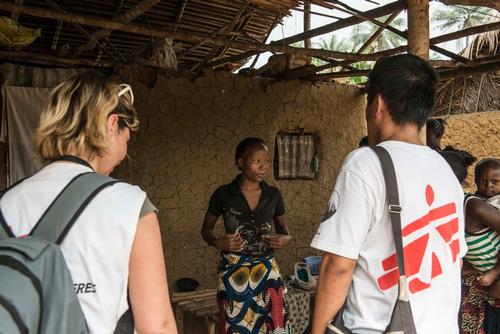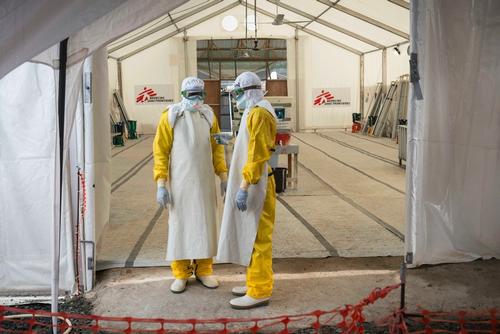Since the Ebola outbreak in West Africa was officially declared on 22 March in Guinea, it has claimed more than 9,100 lives in the region. The outbreak is the largest ever, and is currently affecting three countries in West Africa: Guinea, Liberia and Sierra Leone. Outbreaks in Mali, Nigeria and Senegal have been declared over. A separate outbreak in DRC has also ended.
Following the downward trend of new cases reported in Médecins Sans Frontières (MSF) Ebola management centres across the three affected countries during the first weeks of 2015, between week 5 and week 6 the number of new cases has seen a slight increase (with 19 confirmed admissions on week 6. Surveillance remains weak: the World Health Organization reported that during the last week only about 15% of new cases in Guinea is from known Ebola contacts, while in Sierra Leone the available data is limited (according to WHO, on week 3 21% of new cases were from known contacts). There is almost no information sharing for tracing Ebola contacts between the three most-affected countries. Since a single new case is enough to reignite an outbreak, the level of vigilance should remain high in order not to jeopardise the progress made in stemming the epidemic.
MSF STAFF on ground (as of 10 February)
TOTAL: 325 international and about 4,150 national
Guinea:
76 international, around 800 national
Sierra Leone:
157 international, around 1,750 national
Liberia:
92 international, around 1 600 national
Operational Highlights
MSF’s West Africa Ebola response started in March 2014 and includes activities in Guinea, Liberia, Mali and Sierra Leone. MSF currently employs 325 international and around 4150 national locally hired staff in the region. The organisation operates eight Ebola case management centres (CMCs), providing approximately 650 beds in isolation, and one transit centre. Since the beginning of the outbreak, MSF has admitted more than 8,100 patients, among whom around 4,960 were confirmed as having Ebola. More than 2,300 patients have survived.
More than 1,400 tonnes of supplies have been shipped to the affected countries since March.
Guinea
Following the decrease of new Ebola cases during the first four weeks of 2015, numbers in Conakry rose again and went from 9 confirmed cases (January 30) to 18 confirmed cases as of February 10. Moreover, with many of the country’s prefectures considered as “active”, the epidemic is still geographically spread out. New chains of transmission have been reported in areas previously considered as Ebola-free. MSF deployed rapid response teams that are able to quickly identify, investigate and follow new cases and contacts, as well as quickly setting up isolation units within existing health structures. The number of unreported community death and unsafe burials remains concerning, especially in Conakry. Outreach activities, (active) surveillance, social mobilization and training are ongoing in all projects.
Conakry
There has been an increase in cases with 17 patients at Donka CTE. MSF continues outreach and community sensitization activities in the city but the level of acceptance remains low. The capacity of the non-MSF ETC at Coyah reached its limit with 23 patients during the weekend. Patients from the areas surrounding Coyah were therefore referred to Donka.
Guéckédou
With 1 new admission during the last days, the number of patients remains low. MSF launched a support intervention in the nearby town of Kissidougou, where sensitization activities, support to the surveillance team and health structure evaluation are ongoing.
Preliminary results of the favipiravir trial led by INSERM have been announced. However, it is too soon to draw conclusion on the efficacy of the drug. Therefore the trial is still ongoing.
Rapid Response Teams – Faranah
The rapid response team is currently setting up a transit centre in Faranah to facilitate the individuation and referral of new cases. The team is also involved in surveillance and support to local health structures, and is conducting community sensitisation activities.
Liberia
Liberia has seen a sharp decline in Ebola cases. Due to the overall improvement of the situation in the country, MSF has progressively reduced its Ebola related activities, and is working today in Monrovia in two facilities: the Redemption Hospital transit centre and ELWA 3. However, the counties reporting more contacts may potentially see an increase of cases. The main focus is now on surveillance, infection control and prevention, health promotion and training activities. Support of non-Ebola healthcare remains a priority.
The National Institutes of Health and the Liberian government Ebola Vaccine trial (phase II) started on January 31 at Redemption hospital in Monrovia, with priority being given to 600 health staff and population at risk. MSF is not involved in this trial.
In Monrovia MSF is planning to open a 46 beds paediatric hospital but its maximum total capacity is expected to increase up to 100 beds.
Monrovia: ELWA 3 ETC
During the past two weeks there have been very few admissions in ELWA. Currently this ETC hosts two patients. The downsizing of the centre continues and its capacity is now 30. The survivors’ clinic opened the last week on January and offers psychosocial support, health screening and primary health care to Ebola survivors.
The trial of the experimental Ebola drug brincidofovir in Liberia has been halted due the significant drop in the number of new Ebola cases, coupled with the announcement made on January 30 by the drug’s manufacturer that it would no longer participate in the trial.
Monrovia: Distribution and Outreach
40 Health facilities are being supported and their staff trained on Infections Prevention and Control. A team is also supporting the pediatric and maternal James Davis Junior Memorial (JDJ Hospital) in Monrovia. After MSF did the rehabilitation work to set up infection control and to upgrade the equipment of the triage, consultation rooms and pediatrics ward, MSF staff started working inside the JDJ hospital to support Ministry of Health staff. The maternity opened on the February 9.
Monrovia: Redemption ETU, health promotion and training
Coordination on rapid and effective implementation of infection control trainings in health centres/clinics surrounding MSF Transit Unit is ongoing. Health promotion teams are conducting daily training of trainers sessions for CBOs and district task forces. MSF is also engaged in community dialogue.
MSF started a pilot of a 3-day RITE (Rapid Isolation and Treatment of Ebola) training for County Health Teams staff.
Sierra Leone
The number of admissions to the MSF ETCs remains low, with Kailahun and Bo having reached zero patients admitted to the EMC. However, in all districts outreach activities, surveillance, social mobilization, trainings, etc. remain a priority.
Kailahun
On 22 January, Kailahun district was declared Ebola-free after 42 consecutive days without an Ebola case. MSF and the Ministry of Health are looking together at Kailahun hospital taking over responsibility for future suspected cases, which would allow MSF to close its project in Kailahun. MSF is building an isolation unit in the grounds of the local hospital and training MoH staff. In the meantime, the EMC in Kailahun has been transformed into a transit center, and dismantling of parts of the facility have commenced. Outreach activities have ended in this district.
Bo
The MSF ETC in Bo saw a decrease of cases in late December following the opening of more treatment facilities in different regions of the country. There are currently no patients in the ETC. The last confirmed patient was admitted on January 12, while the last discharge took place on January 26. MSF continues to provide mental health services in the ETC as well as strengthening health promotion activities, training community health workers and visiting quarantined houses in the district, as well as supporting the local alerts team. With some capacity freed up due to the decline in patients in the ETC, the teams are expanding outreach and surveillance activities to all chiefdoms in Bo district. At the same time, decontamination of two wards underway.
Magburaka
After the last patient was discharged on February 9, one new positive case was admitted. The Winnipeg Laboratory, installed inside the EMC, is operating as district lab, working with three other holding centers and 11 community care centers in the area. It has a turnaround time on lab samples of four hours, which has helped reduce the number of patients in holding centers. Outreach activities are ongoing to all chiefdoms in Tonkolili district.
Kissy
On January 8th, MSF opened an Ebola Treatment Center in Kissy, one of the current hotspots of the epidemic, in the outskirts of Freetown. On January 28th, the maternity section of the center (METC) opened, providing obstetric services for Ebola-positive pregnant women. So far, there have been 61 admissions to the center - of which 9 pregnant women, representing 15% of total admissions. Of the 3 confirmed METC patients the outcome to date is that 2 confirmed pregnant women were discharged. One suspected patient is under care in the ETC. The last confirmed case was admitted on January 25 and discharged February 8. Out of the 17 confirmed patients, 8 were discharged.
The first referral of a positive maternity patient from outside the Western Area was received last week. The patient was referred from an ETC operated by GOAL in the district of Port Loko, which has become the latest hotspot.
Freetown/antimalarial distribution
MSF completed the second round of antimalarial distribution on January 16-19th for a target population of 1.8 million people. A total of 1,889,527 beneficiaries have benefited from the distribution in the Western Area. Social mobilization teams completed a house-to-house sensitization on the distribution of antimalarial drugs, with information on the purpose of the campaign and instructions on how to use these medications should be used for malaria prevention. Following this sensitization, a four-day house-to-house distribution of antimalarials was undertaken, where recipients were encouraged to take the artesunate amodiaquine with directly observed therapy (DOT) to support adherence. Preliminary results indicate high levels of coverage and compliance, and MSF has undertaken a survey to assess outcomes. The compliance survey for the 2nd round is ready to start.
Freetown/ Prince of Wales secondary school
The ETC at Prince of Wales School has a 100 beds capacity, with 30 individual rooms for suspect cases to prevent cross-infection, as well as 70 treatment beds for confirmed patients, including an intensive care ward with a Plexiglas corridor to enable more intensive monitoring. With declining transmission, the ETC reduced bed capacity to 20 confirmed and 10 suspect beds. The center has a mobile lab on premises which currently tests 30 samples per day, and can scale to 50 samples tested per day. An Ebola community outreach strategy is underway, including support for epidemiological surveillance related activities, health promotion, and house disinfection. MSF is also conducting survivors’ follow up to monitor mental health and medical consequences that they may face after they have recovered from the disease.
| Date | Cases | Deaths | |
|---|---|---|---|
| Guinea | 07/02/2015 | 3,042 | 1,990 |
| Liberia | 07/02/2015 | 8,881 | 3,826 |
| Sierra Leone | 07/02/2015 | 10,905 | 3,336 |
| Total | 22,828 | 9,152 |





